An Analysis of Leadership and Management in Vodafone's Operations
VerifiedAdded on 2023/02/02
|10
|3396
|92
Report
AI Summary
This report provides a comprehensive analysis of leadership and management practices within Vodafone, a British multinational telecommunications corporation. It begins by comparing the distinct roles and characteristics of leaders and managers, emphasizing their respective responsibilities in guiding employees, building morale, and achieving organizational goals. The report then explores how leaders and managers apply their functions in various situational contexts, such as resolving conflicts between employees and addressing inter-organizational challenges. Furthermore, it delves into different leadership theories, including situational, systems, and contingency leadership, illustrating their application within Vodafone. The report also examines key approaches to operations management, such as lean production, Six Sigma, and queuing theory, and highlights the roles of leaders and managers in implementing these approaches to enhance efficiency and achieve business objectives. Finally, the report underscores the importance and value of operational management in achieving business objectives, emphasizing its contribution to productivity, customer satisfaction, and overall organizational success.
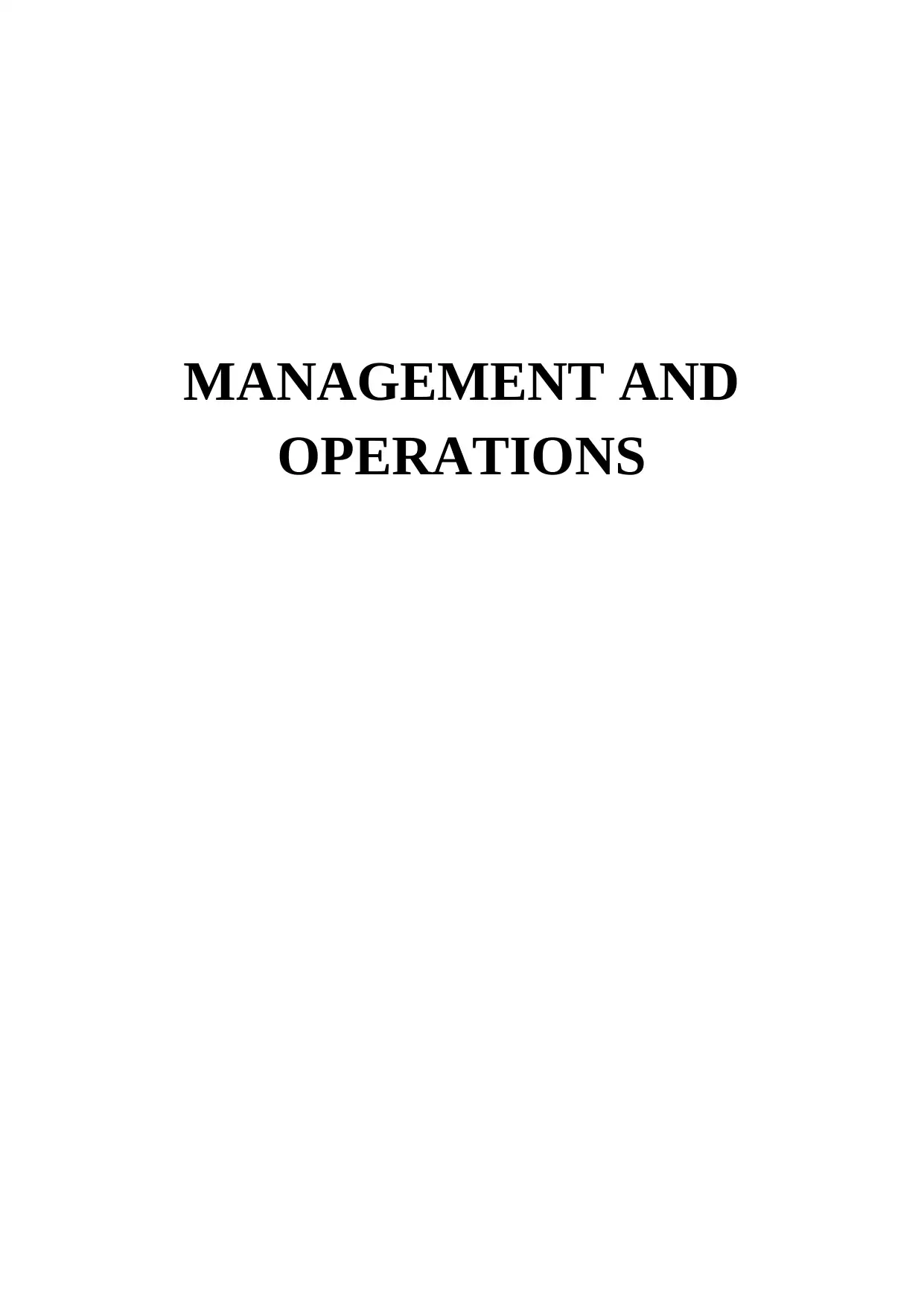
MANAGEMENT AND
OPERATIONS
OPERATIONS
Paraphrase This Document
Need a fresh take? Get an instant paraphrase of this document with our AI Paraphraser
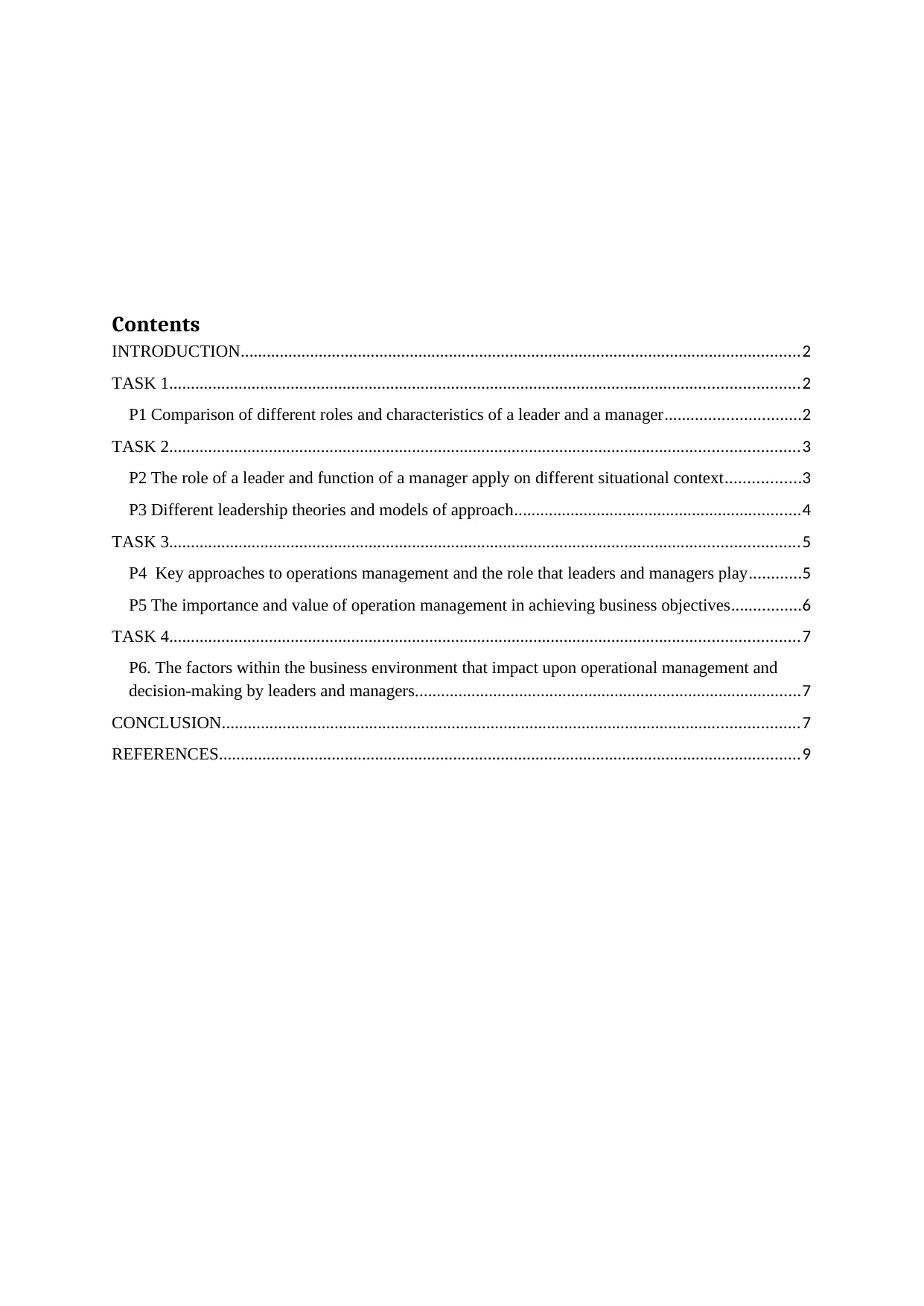
Contents
INTRODUCTION.................................................................................................................................2
TASK 1.................................................................................................................................................2
P1 Comparison of different roles and characteristics of a leader and a manager...............................2
TASK 2.................................................................................................................................................3
P2 The role of a leader and function of a manager apply on different situational context.................3
P3 Different leadership theories and models of approach..................................................................4
TASK 3.................................................................................................................................................5
P4 Key approaches to operations management and the role that leaders and managers play............5
P5 The importance and value of operation management in achieving business objectives................6
TASK 4.................................................................................................................................................7
P6. The factors within the business environment that impact upon operational management and
decision-making by leaders and managers.........................................................................................7
CONCLUSION.....................................................................................................................................7
REFERENCES......................................................................................................................................9
INTRODUCTION.................................................................................................................................2
TASK 1.................................................................................................................................................2
P1 Comparison of different roles and characteristics of a leader and a manager...............................2
TASK 2.................................................................................................................................................3
P2 The role of a leader and function of a manager apply on different situational context.................3
P3 Different leadership theories and models of approach..................................................................4
TASK 3.................................................................................................................................................5
P4 Key approaches to operations management and the role that leaders and managers play............5
P5 The importance and value of operation management in achieving business objectives................6
TASK 4.................................................................................................................................................7
P6. The factors within the business environment that impact upon operational management and
decision-making by leaders and managers.........................................................................................7
CONCLUSION.....................................................................................................................................7
REFERENCES......................................................................................................................................9
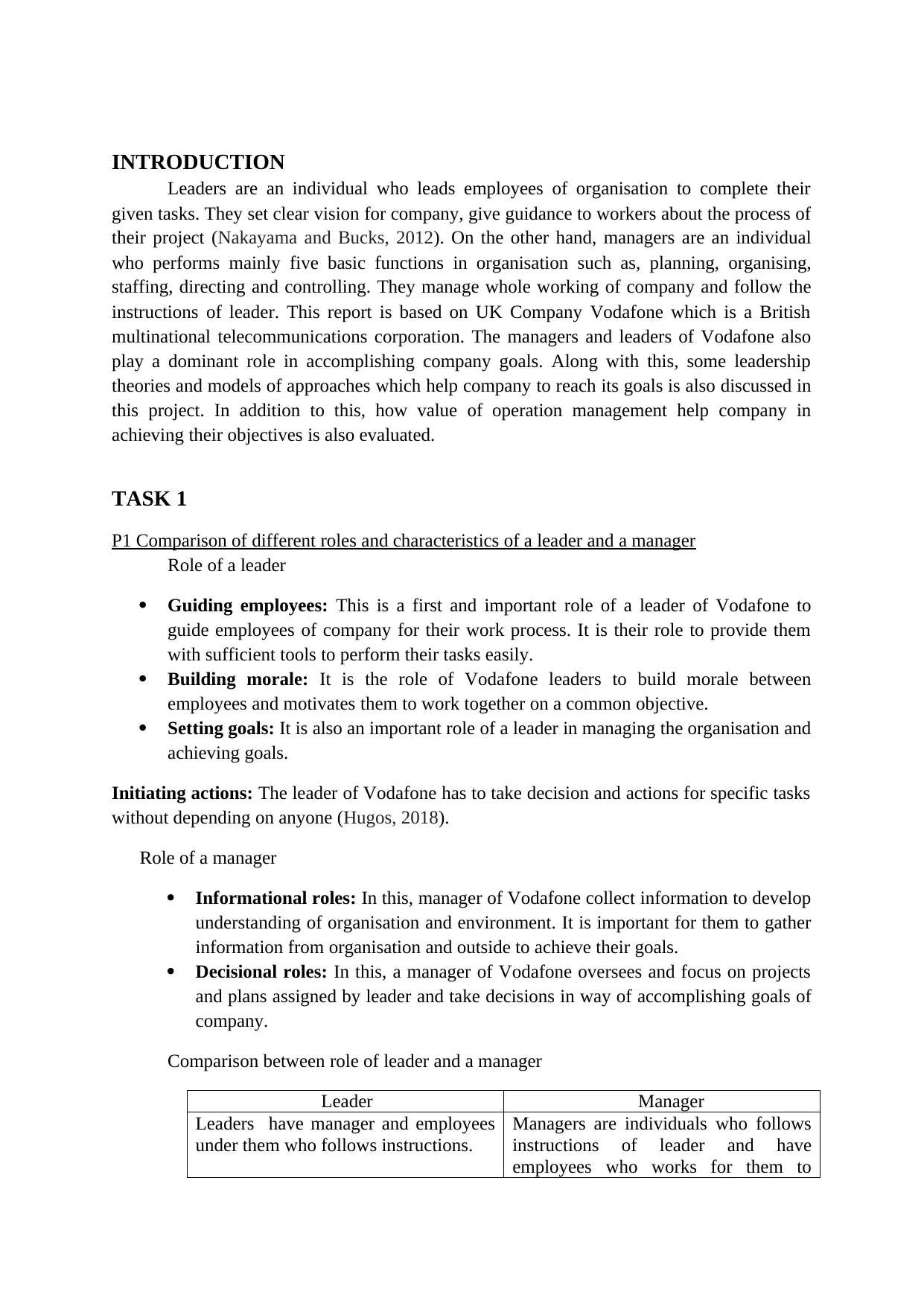
INTRODUCTION
Leaders are an individual who leads employees of organisation to complete their
given tasks. They set clear vision for company, give guidance to workers about the process of
their project (Nakayama and Bucks, 2012). On the other hand, managers are an individual
who performs mainly five basic functions in organisation such as, planning, organising,
staffing, directing and controlling. They manage whole working of company and follow the
instructions of leader. This report is based on UK Company Vodafone which is a British
multinational telecommunications corporation. The managers and leaders of Vodafone also
play a dominant role in accomplishing company goals. Along with this, some leadership
theories and models of approaches which help company to reach its goals is also discussed in
this project. In addition to this, how value of operation management help company in
achieving their objectives is also evaluated.
TASK 1
P1 Comparison of different roles and characteristics of a leader and a manager
Role of a leader
Guiding employees: This is a first and important role of a leader of Vodafone to
guide employees of company for their work process. It is their role to provide them
with sufficient tools to perform their tasks easily.
Building morale: It is the role of Vodafone leaders to build morale between
employees and motivates them to work together on a common objective.
Setting goals: It is also an important role of a leader in managing the organisation and
achieving goals.
Initiating actions: The leader of Vodafone has to take decision and actions for specific tasks
without depending on anyone (Hugos, 2018).
Role of a manager
Informational roles: In this, manager of Vodafone collect information to develop
understanding of organisation and environment. It is important for them to gather
information from organisation and outside to achieve their goals.
Decisional roles: In this, a manager of Vodafone oversees and focus on projects
and plans assigned by leader and take decisions in way of accomplishing goals of
company.
Comparison between role of leader and a manager
Leader Manager
Leaders have manager and employees
under them who follows instructions.
Managers are individuals who follows
instructions of leader and have
employees who works for them to
Leaders are an individual who leads employees of organisation to complete their
given tasks. They set clear vision for company, give guidance to workers about the process of
their project (Nakayama and Bucks, 2012). On the other hand, managers are an individual
who performs mainly five basic functions in organisation such as, planning, organising,
staffing, directing and controlling. They manage whole working of company and follow the
instructions of leader. This report is based on UK Company Vodafone which is a British
multinational telecommunications corporation. The managers and leaders of Vodafone also
play a dominant role in accomplishing company goals. Along with this, some leadership
theories and models of approaches which help company to reach its goals is also discussed in
this project. In addition to this, how value of operation management help company in
achieving their objectives is also evaluated.
TASK 1
P1 Comparison of different roles and characteristics of a leader and a manager
Role of a leader
Guiding employees: This is a first and important role of a leader of Vodafone to
guide employees of company for their work process. It is their role to provide them
with sufficient tools to perform their tasks easily.
Building morale: It is the role of Vodafone leaders to build morale between
employees and motivates them to work together on a common objective.
Setting goals: It is also an important role of a leader in managing the organisation and
achieving goals.
Initiating actions: The leader of Vodafone has to take decision and actions for specific tasks
without depending on anyone (Hugos, 2018).
Role of a manager
Informational roles: In this, manager of Vodafone collect information to develop
understanding of organisation and environment. It is important for them to gather
information from organisation and outside to achieve their goals.
Decisional roles: In this, a manager of Vodafone oversees and focus on projects
and plans assigned by leader and take decisions in way of accomplishing goals of
company.
Comparison between role of leader and a manager
Leader Manager
Leaders have manager and employees
under them who follows instructions.
Managers are individuals who follows
instructions of leader and have
employees who works for them to
⊘ This is a preview!⊘
Do you want full access?
Subscribe today to unlock all pages.

Trusted by 1+ million students worldwide
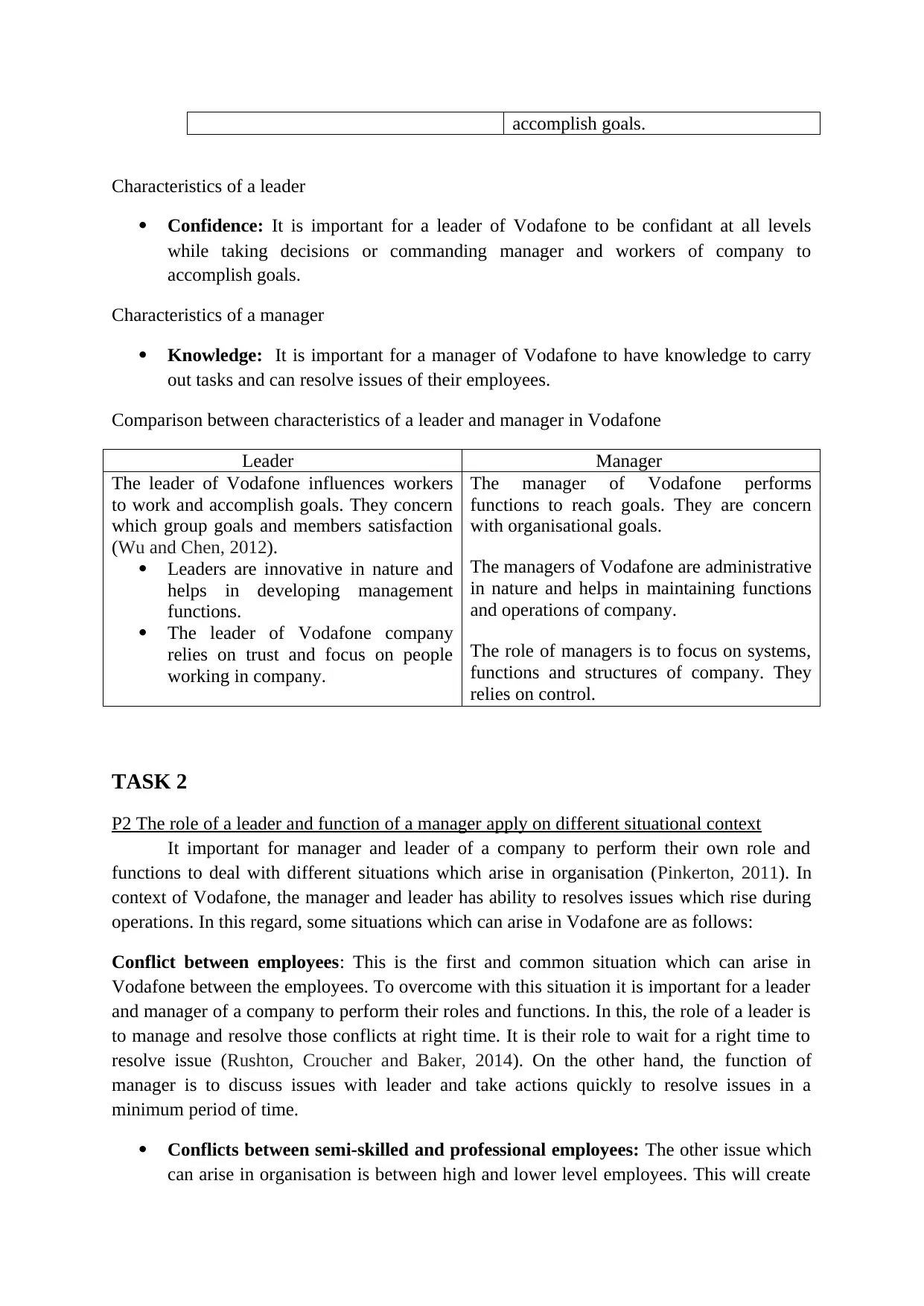
accomplish goals.
Characteristics of a leader
Confidence: It is important for a leader of Vodafone to be confidant at all levels
while taking decisions or commanding manager and workers of company to
accomplish goals.
Characteristics of a manager
Knowledge: It is important for a manager of Vodafone to have knowledge to carry
out tasks and can resolve issues of their employees.
Comparison between characteristics of a leader and manager in Vodafone
Leader Manager
The leader of Vodafone influences workers
to work and accomplish goals. They concern
which group goals and members satisfaction
(Wu and Chen, 2012).
Leaders are innovative in nature and
helps in developing management
functions.
The leader of Vodafone company
relies on trust and focus on people
working in company.
The manager of Vodafone performs
functions to reach goals. They are concern
with organisational goals.
The managers of Vodafone are administrative
in nature and helps in maintaining functions
and operations of company.
The role of managers is to focus on systems,
functions and structures of company. They
relies on control.
TASK 2
P2 The role of a leader and function of a manager apply on different situational context
It important for manager and leader of a company to perform their own role and
functions to deal with different situations which arise in organisation (Pinkerton, 2011). In
context of Vodafone, the manager and leader has ability to resolves issues which rise during
operations. In this regard, some situations which can arise in Vodafone are as follows:
Conflict between employees: This is the first and common situation which can arise in
Vodafone between the employees. To overcome with this situation it is important for a leader
and manager of a company to perform their roles and functions. In this, the role of a leader is
to manage and resolve those conflicts at right time. It is their role to wait for a right time to
resolve issue (Rushton, Croucher and Baker, 2014). On the other hand, the function of
manager is to discuss issues with leader and take actions quickly to resolve issues in a
minimum period of time.
Conflicts between semi-skilled and professional employees: The other issue which
can arise in organisation is between high and lower level employees. This will create
Characteristics of a leader
Confidence: It is important for a leader of Vodafone to be confidant at all levels
while taking decisions or commanding manager and workers of company to
accomplish goals.
Characteristics of a manager
Knowledge: It is important for a manager of Vodafone to have knowledge to carry
out tasks and can resolve issues of their employees.
Comparison between characteristics of a leader and manager in Vodafone
Leader Manager
The leader of Vodafone influences workers
to work and accomplish goals. They concern
which group goals and members satisfaction
(Wu and Chen, 2012).
Leaders are innovative in nature and
helps in developing management
functions.
The leader of Vodafone company
relies on trust and focus on people
working in company.
The manager of Vodafone performs
functions to reach goals. They are concern
with organisational goals.
The managers of Vodafone are administrative
in nature and helps in maintaining functions
and operations of company.
The role of managers is to focus on systems,
functions and structures of company. They
relies on control.
TASK 2
P2 The role of a leader and function of a manager apply on different situational context
It important for manager and leader of a company to perform their own role and
functions to deal with different situations which arise in organisation (Pinkerton, 2011). In
context of Vodafone, the manager and leader has ability to resolves issues which rise during
operations. In this regard, some situations which can arise in Vodafone are as follows:
Conflict between employees: This is the first and common situation which can arise in
Vodafone between the employees. To overcome with this situation it is important for a leader
and manager of a company to perform their roles and functions. In this, the role of a leader is
to manage and resolve those conflicts at right time. It is their role to wait for a right time to
resolve issue (Rushton, Croucher and Baker, 2014). On the other hand, the function of
manager is to discuss issues with leader and take actions quickly to resolve issues in a
minimum period of time.
Conflicts between semi-skilled and professional employees: The other issue which
can arise in organisation is between high and lower level employees. This will create
Paraphrase This Document
Need a fresh take? Get an instant paraphrase of this document with our AI Paraphraser
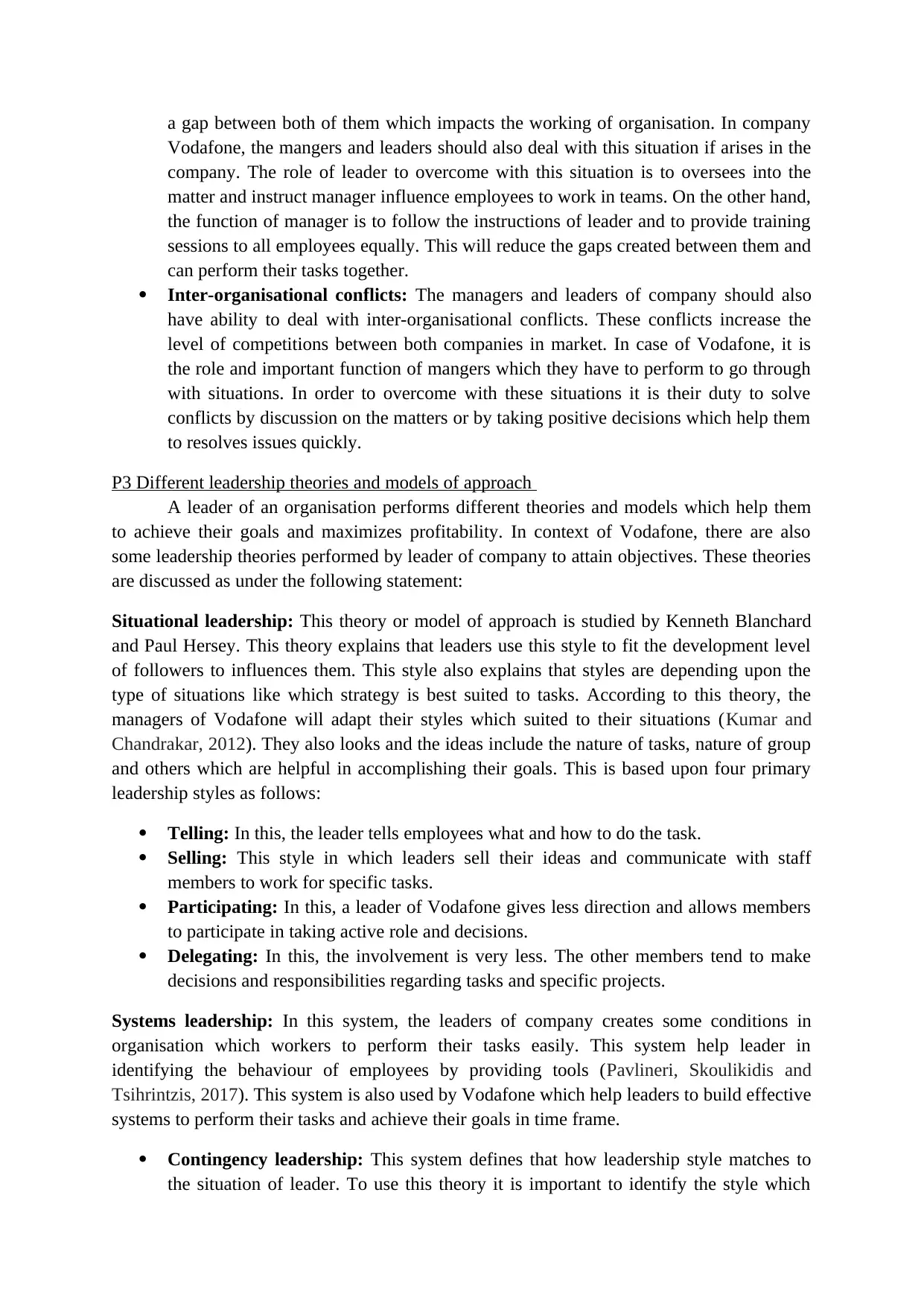
a gap between both of them which impacts the working of organisation. In company
Vodafone, the mangers and leaders should also deal with this situation if arises in the
company. The role of leader to overcome with this situation is to oversees into the
matter and instruct manager influence employees to work in teams. On the other hand,
the function of manager is to follow the instructions of leader and to provide training
sessions to all employees equally. This will reduce the gaps created between them and
can perform their tasks together.
Inter-organisational conflicts: The managers and leaders of company should also
have ability to deal with inter-organisational conflicts. These conflicts increase the
level of competitions between both companies in market. In case of Vodafone, it is
the role and important function of mangers which they have to perform to go through
with situations. In order to overcome with these situations it is their duty to solve
conflicts by discussion on the matters or by taking positive decisions which help them
to resolves issues quickly.
P3 Different leadership theories and models of approach
A leader of an organisation performs different theories and models which help them
to achieve their goals and maximizes profitability. In context of Vodafone, there are also
some leadership theories performed by leader of company to attain objectives. These theories
are discussed as under the following statement:
Situational leadership: This theory or model of approach is studied by Kenneth Blanchard
and Paul Hersey. This theory explains that leaders use this style to fit the development level
of followers to influences them. This style also explains that styles are depending upon the
type of situations like which strategy is best suited to tasks. According to this theory, the
managers of Vodafone will adapt their styles which suited to their situations (Kumar and
Chandrakar, 2012). They also looks and the ideas include the nature of tasks, nature of group
and others which are helpful in accomplishing their goals. This is based upon four primary
leadership styles as follows:
Telling: In this, the leader tells employees what and how to do the task.
Selling: This style in which leaders sell their ideas and communicate with staff
members to work for specific tasks.
Participating: In this, a leader of Vodafone gives less direction and allows members
to participate in taking active role and decisions.
Delegating: In this, the involvement is very less. The other members tend to make
decisions and responsibilities regarding tasks and specific projects.
Systems leadership: In this system, the leaders of company creates some conditions in
organisation which workers to perform their tasks easily. This system help leader in
identifying the behaviour of employees by providing tools (Pavlineri, Skoulikidis and
Tsihrintzis, 2017). This system is also used by Vodafone which help leaders to build effective
systems to perform their tasks and achieve their goals in time frame.
Contingency leadership: This system defines that how leadership style matches to
the situation of leader. To use this theory it is important to identify the style which
Vodafone, the mangers and leaders should also deal with this situation if arises in the
company. The role of leader to overcome with this situation is to oversees into the
matter and instruct manager influence employees to work in teams. On the other hand,
the function of manager is to follow the instructions of leader and to provide training
sessions to all employees equally. This will reduce the gaps created between them and
can perform their tasks together.
Inter-organisational conflicts: The managers and leaders of company should also
have ability to deal with inter-organisational conflicts. These conflicts increase the
level of competitions between both companies in market. In case of Vodafone, it is
the role and important function of mangers which they have to perform to go through
with situations. In order to overcome with these situations it is their duty to solve
conflicts by discussion on the matters or by taking positive decisions which help them
to resolves issues quickly.
P3 Different leadership theories and models of approach
A leader of an organisation performs different theories and models which help them
to achieve their goals and maximizes profitability. In context of Vodafone, there are also
some leadership theories performed by leader of company to attain objectives. These theories
are discussed as under the following statement:
Situational leadership: This theory or model of approach is studied by Kenneth Blanchard
and Paul Hersey. This theory explains that leaders use this style to fit the development level
of followers to influences them. This style also explains that styles are depending upon the
type of situations like which strategy is best suited to tasks. According to this theory, the
managers of Vodafone will adapt their styles which suited to their situations (Kumar and
Chandrakar, 2012). They also looks and the ideas include the nature of tasks, nature of group
and others which are helpful in accomplishing their goals. This is based upon four primary
leadership styles as follows:
Telling: In this, the leader tells employees what and how to do the task.
Selling: This style in which leaders sell their ideas and communicate with staff
members to work for specific tasks.
Participating: In this, a leader of Vodafone gives less direction and allows members
to participate in taking active role and decisions.
Delegating: In this, the involvement is very less. The other members tend to make
decisions and responsibilities regarding tasks and specific projects.
Systems leadership: In this system, the leaders of company creates some conditions in
organisation which workers to perform their tasks easily. This system help leader in
identifying the behaviour of employees by providing tools (Pavlineri, Skoulikidis and
Tsihrintzis, 2017). This system is also used by Vodafone which help leaders to build effective
systems to perform their tasks and achieve their goals in time frame.
Contingency leadership: This system defines that how leadership style matches to
the situation of leader. To use this theory it is important to identify the style which
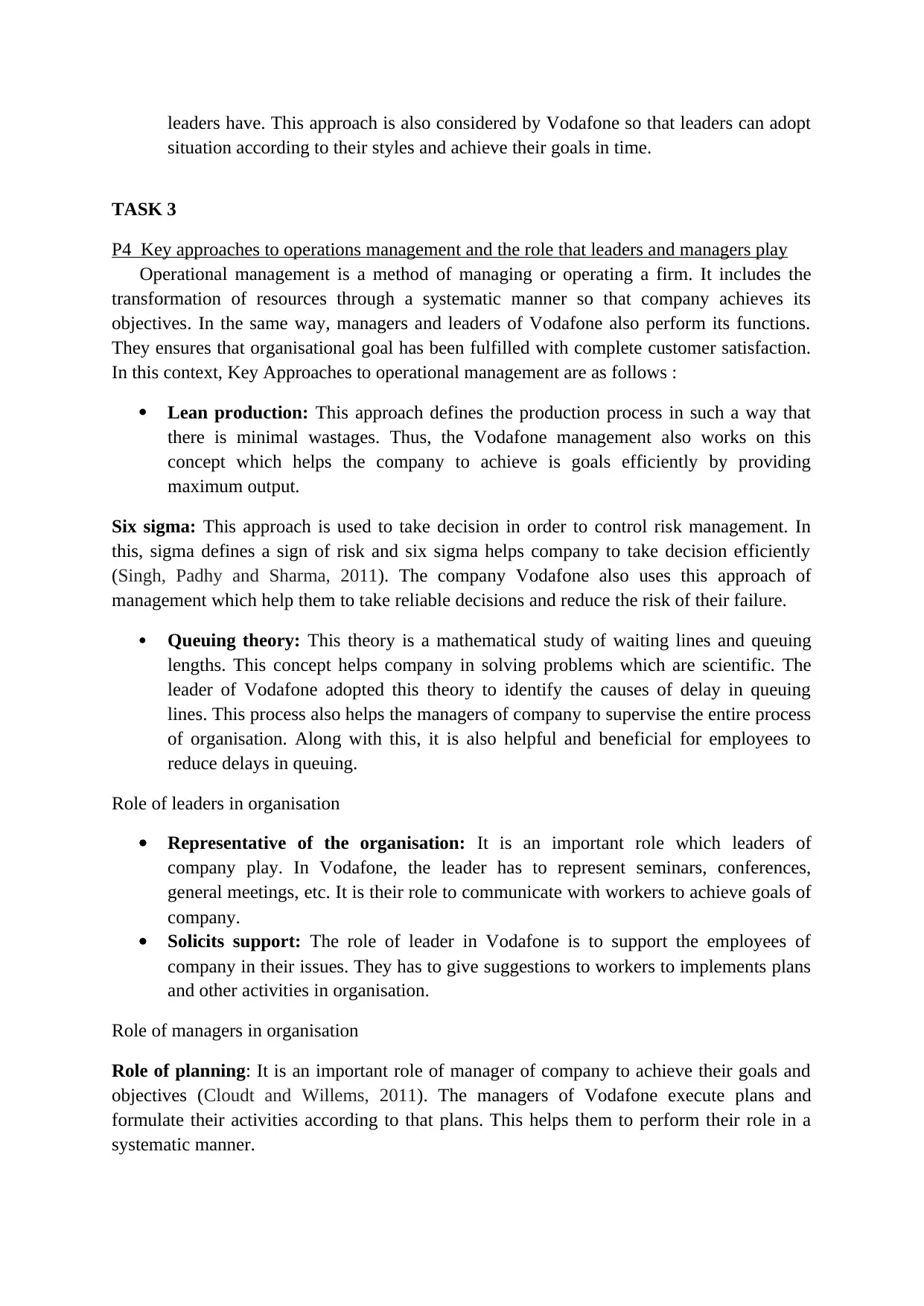
leaders have. This approach is also considered by Vodafone so that leaders can adopt
situation according to their styles and achieve their goals in time.
TASK 3
P4 Key approaches to operations management and the role that leaders and managers play
Operational management is a method of managing or operating a firm. It includes the
transformation of resources through a systematic manner so that company achieves its
objectives. In the same way, managers and leaders of Vodafone also perform its functions.
They ensures that organisational goal has been fulfilled with complete customer satisfaction.
In this context, Key Approaches to operational management are as follows :
Lean production: This approach defines the production process in such a way that
there is minimal wastages. Thus, the Vodafone management also works on this
concept which helps the company to achieve is goals efficiently by providing
maximum output.
Six sigma: This approach is used to take decision in order to control risk management. In
this, sigma defines a sign of risk and six sigma helps company to take decision efficiently
(Singh, Padhy and Sharma, 2011). The company Vodafone also uses this approach of
management which help them to take reliable decisions and reduce the risk of their failure.
Queuing theory: This theory is a mathematical study of waiting lines and queuing
lengths. This concept helps company in solving problems which are scientific. The
leader of Vodafone adopted this theory to identify the causes of delay in queuing
lines. This process also helps the managers of company to supervise the entire process
of organisation. Along with this, it is also helpful and beneficial for employees to
reduce delays in queuing.
Role of leaders in organisation
Representative of the organisation: It is an important role which leaders of
company play. In Vodafone, the leader has to represent seminars, conferences,
general meetings, etc. It is their role to communicate with workers to achieve goals of
company.
Solicits support: The role of leader in Vodafone is to support the employees of
company in their issues. They has to give suggestions to workers to implements plans
and other activities in organisation.
Role of managers in organisation
Role of planning: It is an important role of manager of company to achieve their goals and
objectives (Cloudt and Willems, 2011). The managers of Vodafone execute plans and
formulate their activities according to that plans. This helps them to perform their role in a
systematic manner.
situation according to their styles and achieve their goals in time.
TASK 3
P4 Key approaches to operations management and the role that leaders and managers play
Operational management is a method of managing or operating a firm. It includes the
transformation of resources through a systematic manner so that company achieves its
objectives. In the same way, managers and leaders of Vodafone also perform its functions.
They ensures that organisational goal has been fulfilled with complete customer satisfaction.
In this context, Key Approaches to operational management are as follows :
Lean production: This approach defines the production process in such a way that
there is minimal wastages. Thus, the Vodafone management also works on this
concept which helps the company to achieve is goals efficiently by providing
maximum output.
Six sigma: This approach is used to take decision in order to control risk management. In
this, sigma defines a sign of risk and six sigma helps company to take decision efficiently
(Singh, Padhy and Sharma, 2011). The company Vodafone also uses this approach of
management which help them to take reliable decisions and reduce the risk of their failure.
Queuing theory: This theory is a mathematical study of waiting lines and queuing
lengths. This concept helps company in solving problems which are scientific. The
leader of Vodafone adopted this theory to identify the causes of delay in queuing
lines. This process also helps the managers of company to supervise the entire process
of organisation. Along with this, it is also helpful and beneficial for employees to
reduce delays in queuing.
Role of leaders in organisation
Representative of the organisation: It is an important role which leaders of
company play. In Vodafone, the leader has to represent seminars, conferences,
general meetings, etc. It is their role to communicate with workers to achieve goals of
company.
Solicits support: The role of leader in Vodafone is to support the employees of
company in their issues. They has to give suggestions to workers to implements plans
and other activities in organisation.
Role of managers in organisation
Role of planning: It is an important role of manager of company to achieve their goals and
objectives (Cloudt and Willems, 2011). The managers of Vodafone execute plans and
formulate their activities according to that plans. This helps them to perform their role in a
systematic manner.
⊘ This is a preview!⊘
Do you want full access?
Subscribe today to unlock all pages.

Trusted by 1+ million students worldwide
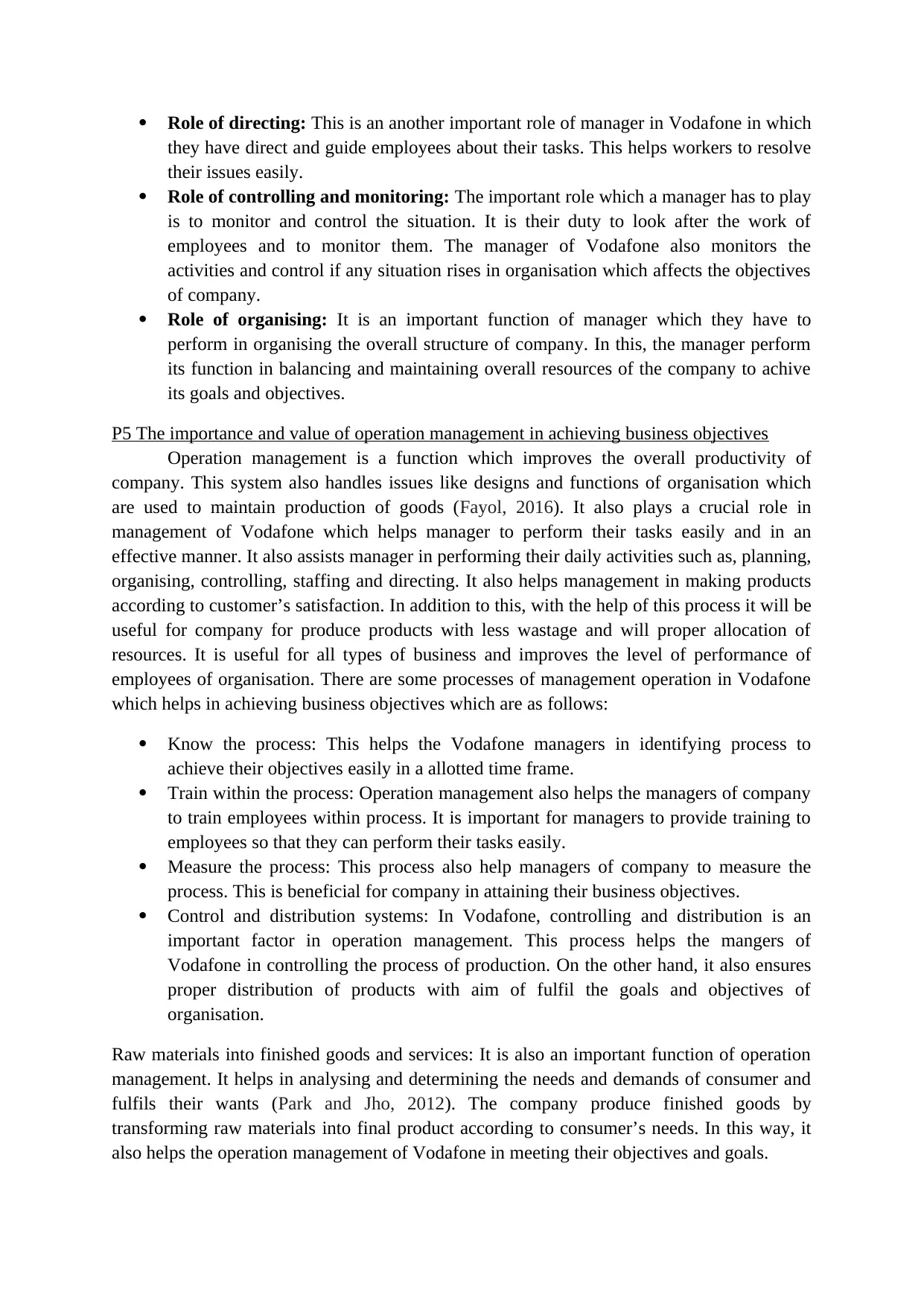
Role of directing: This is an another important role of manager in Vodafone in which
they have direct and guide employees about their tasks. This helps workers to resolve
their issues easily.
Role of controlling and monitoring: The important role which a manager has to play
is to monitor and control the situation. It is their duty to look after the work of
employees and to monitor them. The manager of Vodafone also monitors the
activities and control if any situation rises in organisation which affects the objectives
of company.
Role of organising: It is an important function of manager which they have to
perform in organising the overall structure of company. In this, the manager perform
its function in balancing and maintaining overall resources of the company to achive
its goals and objectives.
P5 The importance and value of operation management in achieving business objectives
Operation management is a function which improves the overall productivity of
company. This system also handles issues like designs and functions of organisation which
are used to maintain production of goods (Fayol, 2016). It also plays a crucial role in
management of Vodafone which helps manager to perform their tasks easily and in an
effective manner. It also assists manager in performing their daily activities such as, planning,
organising, controlling, staffing and directing. It also helps management in making products
according to customer’s satisfaction. In addition to this, with the help of this process it will be
useful for company for produce products with less wastage and will proper allocation of
resources. It is useful for all types of business and improves the level of performance of
employees of organisation. There are some processes of management operation in Vodafone
which helps in achieving business objectives which are as follows:
Know the process: This helps the Vodafone managers in identifying process to
achieve their objectives easily in a allotted time frame.
Train within the process: Operation management also helps the managers of company
to train employees within process. It is important for managers to provide training to
employees so that they can perform their tasks easily.
Measure the process: This process also help managers of company to measure the
process. This is beneficial for company in attaining their business objectives.
Control and distribution systems: In Vodafone, controlling and distribution is an
important factor in operation management. This process helps the mangers of
Vodafone in controlling the process of production. On the other hand, it also ensures
proper distribution of products with aim of fulfil the goals and objectives of
organisation.
Raw materials into finished goods and services: It is also an important function of operation
management. It helps in analysing and determining the needs and demands of consumer and
fulfils their wants (Park and Jho, 2012). The company produce finished goods by
transforming raw materials into final product according to consumer’s needs. In this way, it
also helps the operation management of Vodafone in meeting their objectives and goals.
they have direct and guide employees about their tasks. This helps workers to resolve
their issues easily.
Role of controlling and monitoring: The important role which a manager has to play
is to monitor and control the situation. It is their duty to look after the work of
employees and to monitor them. The manager of Vodafone also monitors the
activities and control if any situation rises in organisation which affects the objectives
of company.
Role of organising: It is an important function of manager which they have to
perform in organising the overall structure of company. In this, the manager perform
its function in balancing and maintaining overall resources of the company to achive
its goals and objectives.
P5 The importance and value of operation management in achieving business objectives
Operation management is a function which improves the overall productivity of
company. This system also handles issues like designs and functions of organisation which
are used to maintain production of goods (Fayol, 2016). It also plays a crucial role in
management of Vodafone which helps manager to perform their tasks easily and in an
effective manner. It also assists manager in performing their daily activities such as, planning,
organising, controlling, staffing and directing. It also helps management in making products
according to customer’s satisfaction. In addition to this, with the help of this process it will be
useful for company for produce products with less wastage and will proper allocation of
resources. It is useful for all types of business and improves the level of performance of
employees of organisation. There are some processes of management operation in Vodafone
which helps in achieving business objectives which are as follows:
Know the process: This helps the Vodafone managers in identifying process to
achieve their objectives easily in a allotted time frame.
Train within the process: Operation management also helps the managers of company
to train employees within process. It is important for managers to provide training to
employees so that they can perform their tasks easily.
Measure the process: This process also help managers of company to measure the
process. This is beneficial for company in attaining their business objectives.
Control and distribution systems: In Vodafone, controlling and distribution is an
important factor in operation management. This process helps the mangers of
Vodafone in controlling the process of production. On the other hand, it also ensures
proper distribution of products with aim of fulfil the goals and objectives of
organisation.
Raw materials into finished goods and services: It is also an important function of operation
management. It helps in analysing and determining the needs and demands of consumer and
fulfils their wants (Park and Jho, 2012). The company produce finished goods by
transforming raw materials into final product according to consumer’s needs. In this way, it
also helps the operation management of Vodafone in meeting their objectives and goals.
Paraphrase This Document
Need a fresh take? Get an instant paraphrase of this document with our AI Paraphraser
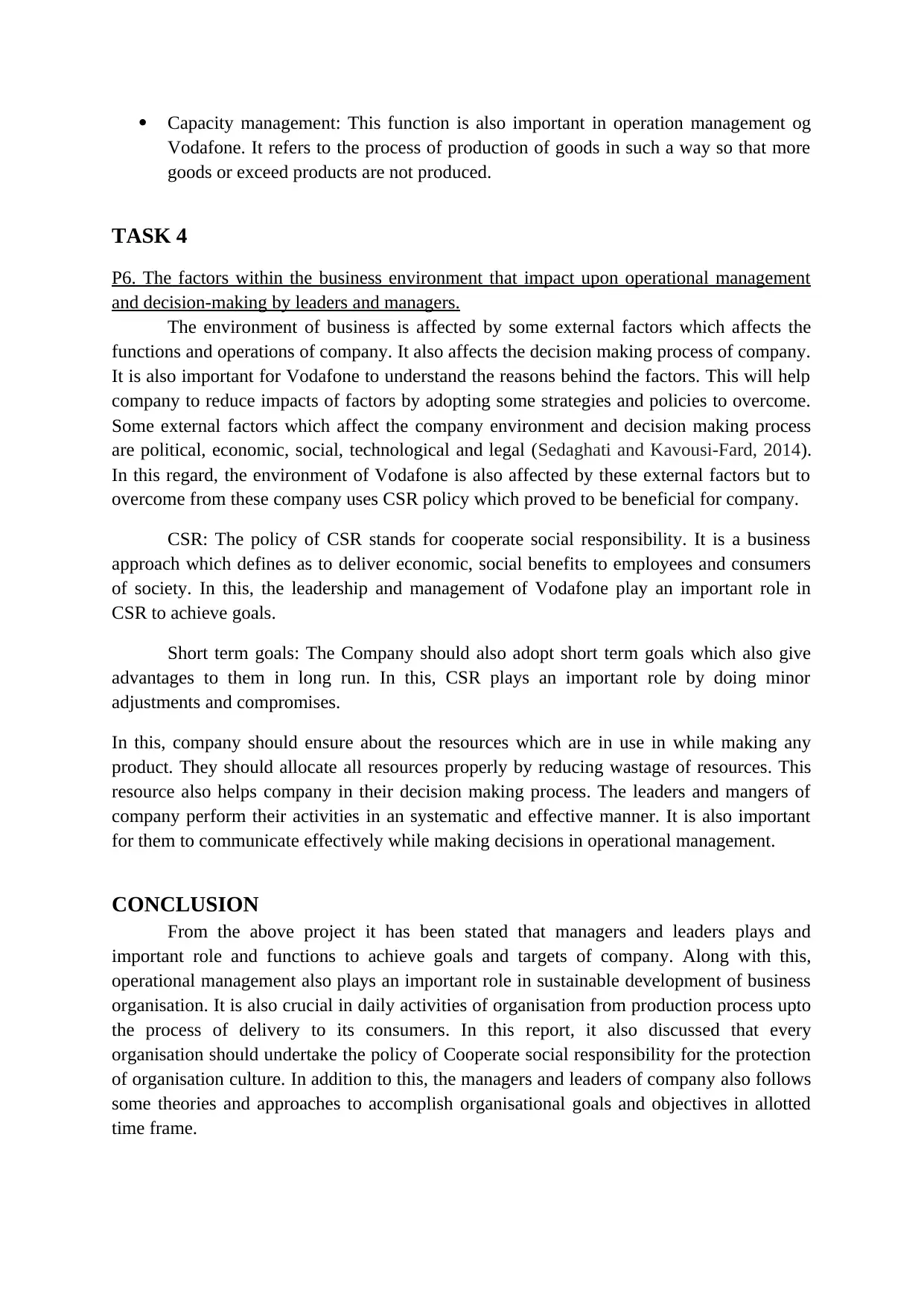
Capacity management: This function is also important in operation management og
Vodafone. It refers to the process of production of goods in such a way so that more
goods or exceed products are not produced.
TASK 4
P6. The factors within the business environment that impact upon operational management
and decision-making by leaders and managers.
The environment of business is affected by some external factors which affects the
functions and operations of company. It also affects the decision making process of company.
It is also important for Vodafone to understand the reasons behind the factors. This will help
company to reduce impacts of factors by adopting some strategies and policies to overcome.
Some external factors which affect the company environment and decision making process
are political, economic, social, technological and legal (Sedaghati and Kavousi-Fard, 2014).
In this regard, the environment of Vodafone is also affected by these external factors but to
overcome from these company uses CSR policy which proved to be beneficial for company.
CSR: The policy of CSR stands for cooperate social responsibility. It is a business
approach which defines as to deliver economic, social benefits to employees and consumers
of society. In this, the leadership and management of Vodafone play an important role in
CSR to achieve goals.
Short term goals: The Company should also adopt short term goals which also give
advantages to them in long run. In this, CSR plays an important role by doing minor
adjustments and compromises.
In this, company should ensure about the resources which are in use in while making any
product. They should allocate all resources properly by reducing wastage of resources. This
resource also helps company in their decision making process. The leaders and mangers of
company perform their activities in an systematic and effective manner. It is also important
for them to communicate effectively while making decisions in operational management.
CONCLUSION
From the above project it has been stated that managers and leaders plays and
important role and functions to achieve goals and targets of company. Along with this,
operational management also plays an important role in sustainable development of business
organisation. It is also crucial in daily activities of organisation from production process upto
the process of delivery to its consumers. In this report, it also discussed that every
organisation should undertake the policy of Cooperate social responsibility for the protection
of organisation culture. In addition to this, the managers and leaders of company also follows
some theories and approaches to accomplish organisational goals and objectives in allotted
time frame.
Vodafone. It refers to the process of production of goods in such a way so that more
goods or exceed products are not produced.
TASK 4
P6. The factors within the business environment that impact upon operational management
and decision-making by leaders and managers.
The environment of business is affected by some external factors which affects the
functions and operations of company. It also affects the decision making process of company.
It is also important for Vodafone to understand the reasons behind the factors. This will help
company to reduce impacts of factors by adopting some strategies and policies to overcome.
Some external factors which affect the company environment and decision making process
are political, economic, social, technological and legal (Sedaghati and Kavousi-Fard, 2014).
In this regard, the environment of Vodafone is also affected by these external factors but to
overcome from these company uses CSR policy which proved to be beneficial for company.
CSR: The policy of CSR stands for cooperate social responsibility. It is a business
approach which defines as to deliver economic, social benefits to employees and consumers
of society. In this, the leadership and management of Vodafone play an important role in
CSR to achieve goals.
Short term goals: The Company should also adopt short term goals which also give
advantages to them in long run. In this, CSR plays an important role by doing minor
adjustments and compromises.
In this, company should ensure about the resources which are in use in while making any
product. They should allocate all resources properly by reducing wastage of resources. This
resource also helps company in their decision making process. The leaders and mangers of
company perform their activities in an systematic and effective manner. It is also important
for them to communicate effectively while making decisions in operational management.
CONCLUSION
From the above project it has been stated that managers and leaders plays and
important role and functions to achieve goals and targets of company. Along with this,
operational management also plays an important role in sustainable development of business
organisation. It is also crucial in daily activities of organisation from production process upto
the process of delivery to its consumers. In this report, it also discussed that every
organisation should undertake the policy of Cooperate social responsibility for the protection
of organisation culture. In addition to this, the managers and leaders of company also follows
some theories and approaches to accomplish organisational goals and objectives in allotted
time frame.
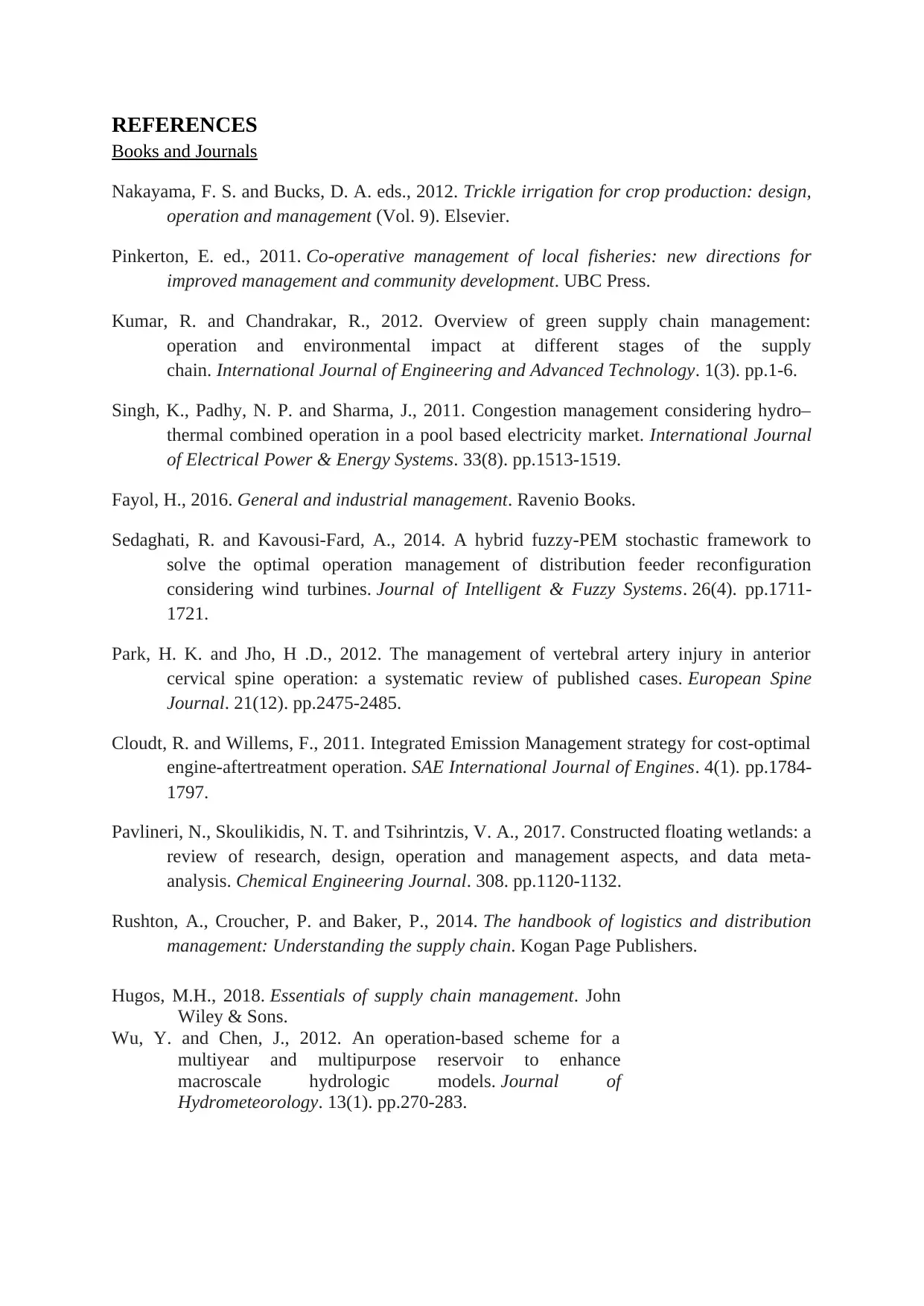
REFERENCES
Books and Journals
Nakayama, F. S. and Bucks, D. A. eds., 2012. Trickle irrigation for crop production: design,
operation and management (Vol. 9). Elsevier.
Pinkerton, E. ed., 2011. Co-operative management of local fisheries: new directions for
improved management and community development. UBC Press.
Kumar, R. and Chandrakar, R., 2012. Overview of green supply chain management:
operation and environmental impact at different stages of the supply
chain. International Journal of Engineering and Advanced Technology. 1(3). pp.1-6.
Singh, K., Padhy, N. P. and Sharma, J., 2011. Congestion management considering hydro–
thermal combined operation in a pool based electricity market. International Journal
of Electrical Power & Energy Systems. 33(8). pp.1513-1519.
Fayol, H., 2016. General and industrial management. Ravenio Books.
Sedaghati, R. and Kavousi-Fard, A., 2014. A hybrid fuzzy-PEM stochastic framework to
solve the optimal operation management of distribution feeder reconfiguration
considering wind turbines. Journal of Intelligent & Fuzzy Systems. 26(4). pp.1711-
1721.
Park, H. K. and Jho, H .D., 2012. The management of vertebral artery injury in anterior
cervical spine operation: a systematic review of published cases. European Spine
Journal. 21(12). pp.2475-2485.
Cloudt, R. and Willems, F., 2011. Integrated Emission Management strategy for cost-optimal
engine-aftertreatment operation. SAE International Journal of Engines. 4(1). pp.1784-
1797.
Pavlineri, N., Skoulikidis, N. T. and Tsihrintzis, V. A., 2017. Constructed floating wetlands: a
review of research, design, operation and management aspects, and data meta-
analysis. Chemical Engineering Journal. 308. pp.1120-1132.
Rushton, A., Croucher, P. and Baker, P., 2014. The handbook of logistics and distribution
management: Understanding the supply chain. Kogan Page Publishers.
Hugos, M.H., 2018. Essentials of supply chain management. John
Wiley & Sons.
Wu, Y. and Chen, J., 2012. An operation-based scheme for a
multiyear and multipurpose reservoir to enhance
macroscale hydrologic models. Journal of
Hydrometeorology. 13(1). pp.270-283.
Books and Journals
Nakayama, F. S. and Bucks, D. A. eds., 2012. Trickle irrigation for crop production: design,
operation and management (Vol. 9). Elsevier.
Pinkerton, E. ed., 2011. Co-operative management of local fisheries: new directions for
improved management and community development. UBC Press.
Kumar, R. and Chandrakar, R., 2012. Overview of green supply chain management:
operation and environmental impact at different stages of the supply
chain. International Journal of Engineering and Advanced Technology. 1(3). pp.1-6.
Singh, K., Padhy, N. P. and Sharma, J., 2011. Congestion management considering hydro–
thermal combined operation in a pool based electricity market. International Journal
of Electrical Power & Energy Systems. 33(8). pp.1513-1519.
Fayol, H., 2016. General and industrial management. Ravenio Books.
Sedaghati, R. and Kavousi-Fard, A., 2014. A hybrid fuzzy-PEM stochastic framework to
solve the optimal operation management of distribution feeder reconfiguration
considering wind turbines. Journal of Intelligent & Fuzzy Systems. 26(4). pp.1711-
1721.
Park, H. K. and Jho, H .D., 2012. The management of vertebral artery injury in anterior
cervical spine operation: a systematic review of published cases. European Spine
Journal. 21(12). pp.2475-2485.
Cloudt, R. and Willems, F., 2011. Integrated Emission Management strategy for cost-optimal
engine-aftertreatment operation. SAE International Journal of Engines. 4(1). pp.1784-
1797.
Pavlineri, N., Skoulikidis, N. T. and Tsihrintzis, V. A., 2017. Constructed floating wetlands: a
review of research, design, operation and management aspects, and data meta-
analysis. Chemical Engineering Journal. 308. pp.1120-1132.
Rushton, A., Croucher, P. and Baker, P., 2014. The handbook of logistics and distribution
management: Understanding the supply chain. Kogan Page Publishers.
Hugos, M.H., 2018. Essentials of supply chain management. John
Wiley & Sons.
Wu, Y. and Chen, J., 2012. An operation-based scheme for a
multiyear and multipurpose reservoir to enhance
macroscale hydrologic models. Journal of
Hydrometeorology. 13(1). pp.270-283.
⊘ This is a preview!⊘
Do you want full access?
Subscribe today to unlock all pages.

Trusted by 1+ million students worldwide

1 out of 10
Related Documents
Your All-in-One AI-Powered Toolkit for Academic Success.
+13062052269
info@desklib.com
Available 24*7 on WhatsApp / Email
![[object Object]](/_next/static/media/star-bottom.7253800d.svg)
Unlock your academic potential
Copyright © 2020–2026 A2Z Services. All Rights Reserved. Developed and managed by ZUCOL.





